
Recently on Cyclingnews.com |
An interview with Jobie Dajka, October 1, 2004
What doesn't kill you...
Australian sprinter and keirin specialist Jobie Dajka was sent home from the Australian team's pre-Olympic camp and suspended as a result of having misled the Anderson enquiry into the Mark French doping affair. He spoke to Karen Forman about his disappointment with the process that kept him out of the Olympics, his intention to return to racing and his renewed fire.
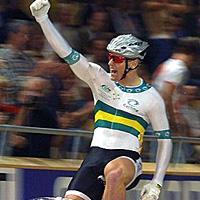
|
Top Australian track sprinter and 2002 keirin world champion Jobie Dajka is in limbo. After four years of hard work, focusing on the 2004 Athens Olympics, he now doesn't know what he's going to do next.
It's not unusual for a rider to take a substantial break after a major event, especially in track cycling, where the Olympics is the one chance in four years athletes get to bask in the world's attention. But Dajka, of course, hasn't been to the Olympics. Despite being one of Australia's best medal chances, the 22-year-old from Adelaide was sacked from the team shortly before the Games, accused of having lied to the enquiries into the Mark French doping affair.
Dajka returned to Australia from the team's pre-Olympic camp in Germany in early August and unsuccessfully appealed his expulsion from the team. He still feels his expulsion and subsequent suspension was unjust.
"We had a disciplinary hearing, with [Cycling Australia president and senior vice-president] Mike Victor, Mark Fulcher and, I forget the other lady's name, the Minister for Sport, and we basically had a talk about all the things that had happened and where I fit into the whole thing. It was very disappointing for me... two out of the three things were wrong. They said I lied in the Anderson inquiry and the Justin Stanwix inquiry and had brought the sport into disrepute.
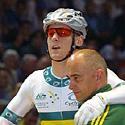
|
"(But) the only thing connected was that I had maybe misled the Anderson report, which didn't say I had flatly lied, either... but maybe I had misled the inquiry by not being specific. I didn't lie in the Justin Stanwix inquiry or bring the sport into disrepute, though. They were all private inquiries; I never said anything in public, so how could it be bringing the sport into disrepute?"
Dajka ended up as the only rider apart from French himself to be found guilty of any wrong-doing in the fallout from the December 2003 discovery of a makeshift sharps bucket in Mark French's room at the Australian Institute of Sport facility in Adelaide. That bucket contained empty vials of equine growth hormone which French denied knowledge of, claiming that five other riders had used his room to inject themselves.
Although CAS arbitrator Malcolm Holmes QC called French's evidence "implausible" and two of the five were subsequently able to show they had not even been in Australia at the time, enquiries into the five continued. DNA testing of the contents of the sharps bucket produced a match with Dajka, contradicting his apparent denials to the Stanwix and Anderson enquiries that he had used French's room to inject himself.
Australian Olympic Commission (AOC) president John Coates announced Dajka's expulsion from the team, saying "Dajka confirmed to Craig Phillips that he had been untruthful to both inquiries. He admitted to self injecting in French's room ... clearly Dajka has breached his conditional selection to the Team.
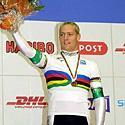
|
"He has brought himself, the sport of cycling, the team and the AOC into disrepute and censure. As a result I have terminated his selection to, and membership of, the 2004 Australian Olympic Team which was conditional on Anderson's finding."
But Dajka claims he wasn't just asked about using French's room, but about being there with a group of other riders. "The Anderson inquiry investigated the whole sprint group and it was to find the truth about Mark's allegations," he says. "They asked stuff to do with French's allegation of five to six guys being in a room shooting up together. All the questioning was based around that."
Faced with his expulsion from the team he had dreamed of being a part of for four years, Dajka said he was aware that he could have appealed against his sentence to Cycling Australia, "but I didn't want to drag it on any longer, they had the Olympics to think about."
And perhaps he had had enough? Even the hardest critic couldn't deny it was a lot for anyone to deal with, but particularly a 22 year old with no media experience.
"There were a couple of times I felt caught in the headlines. Like at the media conference where 60 Minutes turned up and absolutely grilled us," says Dajka. "I wasn't prepared for that. It's basically having someone who doesn't do cycling come out and just try to destroy us. They were so out of their league. They were just trying to destroy us. I just felt like standing up and saying, `give us a fair go'. We knew the stuff that was being alleged wasn't the truth. The hardest thing for me is that everyone has connected me not being at the Olympics with being a drug cheat and I am not."
The sad irony of the whole affair is that French and Dajka - in fact, "everyone in the team, were good mates."
But then "all this went down, he went home and didn't talk to anyone about it. We saw him a little bit at the World's but that was it. There are lots of people who were angry with him, people who don't know him from a bar of soap, people not even involved with cycling. For me personally he hasn't accused me of taking anything illegal. Obviously I am not happy. He's not my best mate, but I don't want to shoot him or anything. Don't get me wrong, I am definitely not friends with him anymore. There are a couple of guys in there who have been accused of taking illegal stuff..."
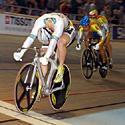
|
Dajka is, as one would expect, disappointed. "A lot of emotions come into it," he says, "disappointment, anger, sadness. I don't know if I will ever come to terms with it, really, with what I have lost out of a mistake that was so small. I don't even think that it was a mistake. I think it was a mistake on behalf of Anderson for not asking the right question. All the questions I answered were on the basis of shooting up in a room with five guys... I denied it and I still do because it just doesn't happen. I was never asked specifically if I had had injections in French's room. I always admit to having vitamin B and once I got a warning letter from CA for admitting to having Vitamin B.
"The only times I had it was when I was sick, maybe five or six times and then I was given it by the team doctor. That's the other thing that's so frustrating... I don't know, I just feel like whoever was out to get cycling was after a scapegoat... I was the only one left at end of the day. They tried to get [Sean] Eadie but when they couldn't get him they aimed for me."
Being sent home, he says, was humiliating, but he still felt that his team was behind him. "When I was asked to leave I felt like I was being sent home because the higher powers were sending me home. I have been speaking to a lot of people since... I definitely didn't have anything but support. Obviously the sprint group, they definitely felt like that. Sean was a bit pissed at me actually, because he had to ride the sprint then and hadn't trained for it.
"(But) everyone knew the situation and what was going on. Everyone outside of our core group really doesn't know what's going on...
"[Coach] Shayne Bannan just kept telling me you have to look at it rationally and shut everything out, which I tried to do, but then when the Olympics were on TV, I was fine watching the swimming, then when the cycling popped up I just broke down.
"The main thing for me was the team sprint, I know I definitely could have been a help in that. They were only 0.4sec off first place... I could have definitely contributed. At the same time it was great to see Ryan [Bayley] win both events [the keirin and the sprint]. He was in a league of his own. He had trained really hard and had been really dedicated.
"It was sad not to be a part of it."
Believing so strongly that he was wronged, Dajka says he has carefully considered what his next steps might be.
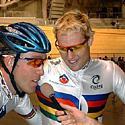
|
"In terms of missing the Olympics, I am just going to leave it," he says. "If I tried to sue anyone there would be too many technicalities. In the court case there were so many things that went our way for the appeal, then just one thing, one technicality got me."
But he feels that the media has presented him as a drug cheat, despite the lack of conclusive evidence that he used the equine growth hormone found in French's room. The Anderson enquiry decided that the DNA matching Dajka's profile, found on the Equigen vials could have been transferred from elsewhere.
"In terms with all the stuff that has been printed in the media, I am still considering that. The only thing is coming up with money to go through it. I have already spent this year and half of last year's Japan [keirin series] money on it also my last 18 months wages... at this stage, $60,000."
And as for his cycling career?
"My goal now is just that I want to go out there and present myself well and get back to where I was, in the top few, probably top four in the world in the sprint and keirin and see what happens in the team sprint," he says. "I want to get back into the AIS and CA and recreate my image.
"I don't know how I will do it, it's something I will have to speak to my manager Kerry Ruffles about."
He laughs, for the first time since this interview began. "Kerry's trying to get me to grow a beard," he says. "He reckons that's done well for Sean Eadie."
But first he has to re-establish his relationship with the Australian Institute of Sport, re-apply for the scholarship that he has held since 1999 (which like all AIS scholarships expires at the end of the year) and find out if there's a way forward for him in the Australian track team.
"I don't know where I really stand," he says. "Something will have to work out in the next few weeks. I was just going to wait a couple of weeks, for people to recover, then get in touch with the AIS and Martin (head coach Barras) and (manager) Michael Flynn and see where they see me fitting in. I am pretty sure from what I been told before that I will be able to train with the guys fulltime when they come back. But at the moment I am not doing much at all. I have got a bit of a cold at the moment, but it's more just a mental thing, really. I have been in training for so long, so intensely, that really it's just a mental break. At the start you really enjoy having a rest, especially after a big competition but then towards the end you get itchy to get back on the bike. But this time I didn't get to have the big competition. It's been 100 per cent frustration really; it's been completely different to what I have experienced before.
"Some days I get up and think I will start training today, but then I remember the plan was to have the proper break."
At the moment, Dajka isn't even exactly sure how long he has been suspended for. "I don't know when it started, when I left camp I guess, so it must be roughly five or six months, till January. But a couple of the things that I was suspended for were actually wrong according to the Court of Arbitration (CAS) hearing. Two out of the three things were wrong, so I am hoping to reduce it to two or three months so at least I can get the World Cups in before Christmas."
However it all works out, he's philosophical about being caught in the French affair fall-out and determined to return.
"All of this, it all comes back to just one 19 year old kid not developed, trying to get an edge to catch up to people like Ryan, myself and Big Man [the team's nickname for Eadie]," he says, referring to Mark French. "He's made a mistake, he's admitted to taking illegal drugs and brought everything down.
"I am pretty disappointed, but I will be back, that's for sure. And when I do get back, I will definitely have a different fire inside me. I remember how much disappointment I felt missing the Olympics in 2000... but last time I could admit I wasn't good enough. This time I should have been there but I wasn't. This will just make me stronger."
